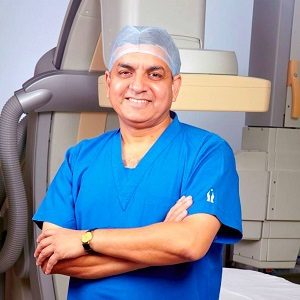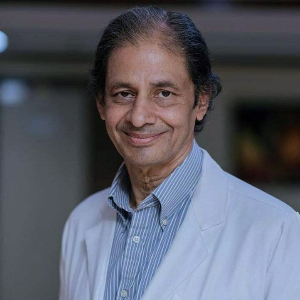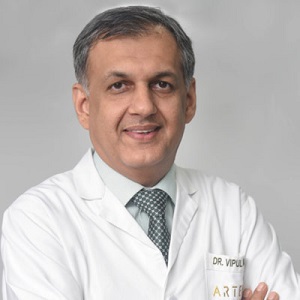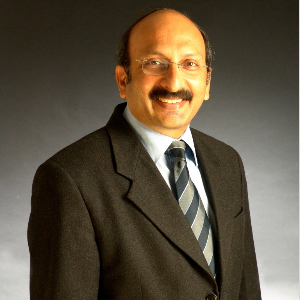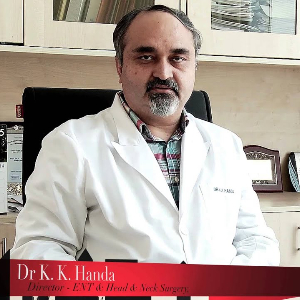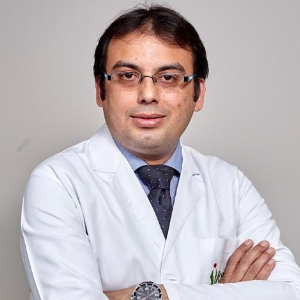Best Doctors in India for Alcoholic Hepatitis Treatment
- Interventional Neuro-Radiologist, Gurugram, India
- Over 18 years of experience
Profile Highlights:
- Dr. Vijay Kant Dixit has a rich experience of more than 18 years in the field of Interventional Neuroradiology.
- He has successfully treated more than lakhs of patients and is very successful in curing patients with rare diseases and illnesses.
- Dr. Vijay Kant Dixit has performed more than 10,000 cerebral and spinal angiograms and about 2000 Neuro-interventions including around 1,400 aneurysm coiling.
- Obstetrician & Gynaecologist, Gurugram, India
- Over 26 years’ experience
Profile Highlights:
- Dr. Mukta Kapita has attained expertise in managing high-risk pregnancies, as well as laparoscopic and hysteroscopic surgeries. She also excels in urogynaecological procedures with more than 20 years of experience in this field.
- She has traveled all over the country, and the world, and has been exposed to some of the best equipment and hospitals in this field.
- Orthopedic Surgeon, Gurugram, India
- Over 30 years’ experience
Profile Highlights:
- Dr. Ashok Rajgopal is often considered the best Orthopedic Surgeon in India. He was awarded the Padma Shri by the President of India in 2014 for his impeccable service to Orthopedics in India.
- He is a highly knowledgeable and skilled orthopedic surgeon with more than 25,000 Total Knee Replacement surgeries to his name. He also holds the credit for more than 3200 joint replacement surgeries and over 9950 arthroscopic surgeries and 28,000 arthroplasties.
- He holds a unique stint of performing 28 Total Knee Replacement surgeries in less than 12 hours and has achieved several other milestones in his career.
- Plastic & Cosmetic Surgeon, Gurugram, India
- Over 20 years’ experience
Profile Highlights:
- Dr. Vipul Nanda is known as one of the most reputed plastic surgeons in India and has over 20 years of experience. Dr. Nanda did his MS from AIIMS and MRCS in UK. Following MCh from PGI in 1997 he underwent advanced fellowships under world leaders in cosmetic and plastic surgery in Spain, Japan, U.K. & USA.
- Throughout his career, Dr. Vipul Nanda has presented and published his technique of cleft palate repair and rhinoplasty for cleft patients at various national and international fora which have been acclaimed by his peers.
- Interventional Cardiologist, Gurugram, India
- Over 30 years’ experience
Profile Highlights:
- Dr. Praveen Chandra is one of the most well-known and respected Interventional Cardiologists in India and performs over 5000 percutaneous and diagnostic interventions every year.
- He specializes in devising techniques that help minimize open surgeries. Dr. Praveen Chandra performed the first Percutaneous Aortic Valve implantation without surgery in India.
- He also developed techniques to reduce the number of patients requiring bypass surgeries and has been trying to make angioplasty techniques more accurate to help with the treatment of multiple blocked arteries.
- Interventional Cardiologist, New Delhi, India
- Over 23 years experience
Profile Highlights:
- Dr. Amit Mittal is a cardiologist working at Indraprastha Apollo Hospital in New Delhi with experience of over 23 years in Interventional Cardiology.
- He is good to consult for Angiogram, Angioplasty, and Bypass Surgery. Dr. Mittal has performed over 15,000 cardiac procedures till now. He offers services like EPS and RFA procedures, pacemaker implantation, ECG, complex surgery of heart valve replacement, and angina treatment, to name a few.
- Apart from that, Dr. Mittal won a Gold medal in MBBS 1st y and for the highest marks in obstetrics and gynecology. He published many papers in national and international medical journals and chapters in textbooks.
- ENT, Head & Neck Surgeon, Gurugram, India
- Over 27 years’ experience
Profile Highlights:
- Dr. Kumud Kumar Handa is a highly acclaimed ENT and Head and Neck Surgeon in India with specializations in Head and Neck cancer surgery.
- Dr. K K Handa’s expertise in the field of ENT is prominent with the 27 years of experience that he has in the field.
- His area of interest includes voice surgery, laser surgery, endoscopic sinus surgery, cochlear implant surgery, and head and neck surgery. He has helped in the treatment of a number of head and neck cancer patients with different types of cancer surgeries.
- Surgical Oncologist (Breast), Gurugram, India
- Over 20 years’ experience
Profile Highlights:
- Dr. Kanchan Kaur is a leading Surgical Oncologist for the treatment of Breast Cancer.
- She has performed more than 3000 sentinel node biopsies and is trained in oncoplastic surgery as well as surgery for early breast cancers.
- Dr. Kaur also holds extensive training in the management and treatment of benign breast diseases and disorders.
- She received her training in breast cancer treatment from some of the best breast specialist institutes in London, Paris, and New York.
- Nephrologist, New Delhi, India
- Over 35 years’ experience
Profile Highlights:
- Dr. Colonel Akhil Mishra is currently working as Sr. Consultant, Nephrology at Indraprastha Apollo Hospital, New Delhi. He is known for establishing the Department of Nephrology and Transplant at Apollo Hospital in 1995. He has more than 35 years of experience in this field.
- Prior to this he was working in the Army Medical Corps for 28 years (1965-1993), where he held the position of Senior Advisor in Medicine and Nephrology.
- Dr. Akhil Mishra is also known for conducting the First Kidney Transplant of the Indian Armed Forces at Army Hospital, Delhi in 1991.
- Dr. Mishra took pre mature retirement at the rank of Colonel in the year 1993. Subsequently, he established the Department of Nephrology in Escorts Research & Referral Hospital.
- He had been awarded the Vishisht Seva Medal by the President of India in 1980. He started the first kidney transplant in Army and Apollo Hospital, Delhi.
- Throughout his career, Dr. Akhil Mishra has been awarded Star Performer Consultant three times, at Indraprastha Apollo Hospital, Jan 2013, Sept 2014 & Jan 2015.
- Dr. Mishra has also been honored in 2013, by His Holiness the Dalai Lama for his dedicated work in the field of Kidney transplantation.
- He was also felicitated by the Indian Society of Nephrology (North Zone) with the Life Time achievement Award in Nephrology on 23rd Jan.2015 for his huge contribution to the growth of Nephrology.
- Pediatric Hemato Oncologist & BMT Surgeon, Gurugram, India
- Over 20 years’ experience
Profile Highlights:
- Dr. Vikas Dua is one of the best Pediatric Hemato Oncologist and Bone Marrow Transplant surgeons in India with over 200 pediatric Bone Marrow Transplants to his credit.
- His specialty lies in Pediatric haploidentical transplants and also finds interest in Bone Marrow Transplants for Leukemia and Thalassemia in pediatric patients.
- Dr. Vikas Dua received his training in Pediatric BMT from St. Jude Children’s Research Hospital in Memphis and holds Fellowship in Pediatric BMT from the National University Hospital in Singapore.
Best Hospitals in India for Alcoholic Hepatitis Treatment
ALCOHOLIC HEPATITIS
Alcoholic hepatitis is a liver infection, which is mainly caused by frequent, heavy use of alcohol. Fat can build up in the liver cells, which might lead to inflammation as well as scarring of the liver.
Alcoholic hepatitis might be mild or severe. A patient might even need a liver transplant if proper treatment is not provided, or if they don’t stop consumption of alcohol.
It is also notable that all heavy drinkers don’t develop this condition, and sometimes this condition even develops in people who drink moderately. However, if you are diagnosed with this condition, it is important for you to quit drinking alcohol. People who continue drinking alcohol might face a huge risk of serious liver damage as well as death.
Symptoms
Depending on the amount of damage to the liver, the symptoms can vary. If you are having a mild form of the disease, you might not even experience any symptoms at all. However, as the damage continues to grow, you might experience the following:
- Changes in appetite
- Dry mouth
- Weight loss
- Pain or swelling in the abdomen
- Jaundice, or yellowing of the skin or eyes
- Fever
- Nausea and vomiting
- Easy bleeding or bruising
- Changes in your mental state, including confusion
- Fatigue
The symptoms of this condition are similar to those caused by a few other health conditions. Therefore, if you develop any of these symptoms, it is best to get a proper diagnosis as well as begin treatment.
Causes & risk factors
Alcoholic hepatitis generally develops when the alcohol you drink causes damage to your liver. However, it is not clear why alcohol does this damages only to some heavy drinkers.
Few factors that are known to play a role in this condition include:
- The body’s process that breaks down alcohol produces some toxic chemicals
- These chemicals can trigger inflammation that can destroy the liver cells
- Thus, over time, scars replace healthy liver tissue, thus interfering with the function of the liver
- This irreversible scarring, which is also termed cirrhosis, is the final stage of alcoholic liver disease
If you have hepatitis C and continue to drink, even moderately, you are more likely to develop cirrhosis.
Some heavy drinkers are also malnourished because they don’t eat a proper balanced diet. Alcohol and its byproducts also prevent the body from absorbing nutrition properly. Lack of nutrition can contribute to liver cell damage.
Some other risk factors that can lead to this condition include:
- Your sex- Women are usually at a higher risk of developing alcoholic hepatitis since the way alcohol is processed in women is different.
- Binge drinking- Having over five drinks within two hours for men and four or more for women can increase the risk of alcoholic hepatitis.
- Obesity- Heavy drinkers who are overweight are also more likely to develop alcoholic hepatitis and to progress from that condition to cirrhosis.
- Race and ethnicity- Hispanic and Negroid people might be at higher risk of alcoholic hepatitis.
- Genetic factors- According to studies, there may be a genetic component in alcohol-induced liver disease. However, it is difficult to separate genetic and environmental factors.
Diagnosis
If you are showing symptoms of alcoholic hepatitis, your doctor will first inquire about your medical history and alcohol consumption. Next, he/she will perform a physical exam to see if you have an enlarged liver or spleen. They might also need a few more tests to confirm your diagnosis, such as:
- Complete blood count (CBC)
- Liver function test
- Ultrasound of the liver
- Abdominal CT scan
- Blood clotting tests
In some cases, a liver biopsy might also be needed to confirm the diagnosis of alcoholic hepatitis. A liver biopsy requires your doctor to remove a tissue sample from your liver, which is then tested in the lab. This method helps to show the severity and type of liver disease.
Treatment
Stopping alcohol consumption is the most important treatment for alcoholic hepatitis. There is no cure for this condition, but treatment can help in reducing or eliminating symptoms, or stopping its progression.
It is also important to note that scarring of the liver is permanent, but treatment can aim to restore as much function as possible.
Dietary changes
Medication
Liver transplant
The best hope of recovery is to be aware of the signs and symptoms as well as to reduce, manage, or if possible, completely stop consumption of alcohol.
Complications
Alcoholic hepatitis might lead to severe other complications such as:
- Enlarged veins (varices)- In this condition, blood that is unable to flow freely through the portal vein, can back up into other blood vessels in your esophagus or stomach.
- Hepatic encephalopathy- This condition can be caused by the buildup of toxins if your damaged liver is unable to remove all the toxins from your body. It involves confusion, drowsiness, and slurred speech.
- Ascites- Ascites is a condition in which the fluid that accumulates in the abdomen may get infected and thus, require treatment with antibiotics. Although this condition is not life-threatening, it can be a sign of advanced alcoholic hepatitis, or cirrhosis.
- Kidney failure- A damaged liver affects blood flow to the kidneys, thus resulting in kidney failure.
- Cirrhosis- The scarring of the liver might lead to liver failure.
Prevention
Alcoholic hepatitis might be prevented if you take the following steps:
- Drink alcohol in moderation, if at all- For healthy adults, moderate drinking means no more than one drink a day for women of all ages and men older than 65, and not over two drinks a day for men aged 65 and younger. However, if you prevent all alcohol, it is a certain way to prevent this condition.
- Check before mixing medications and alcohol- Ask your doctor if it’s safe to drink alcohol while you are taking medications. Consider reading the warning labels on over-the-counter medications as well. Don’t drink alcohol when you are taking medications that warn of complications when combined with alcohol.
- Protect yourself from hepatitis C- Hepatitis C is an infectious liver disease that is caused by a virus. If it is left untreated, it may lead to cirrhosis. If you are having hepatitis C and you consume alcohol, you’re generally more likely to develop cirrhosis than if you don’t drink.

